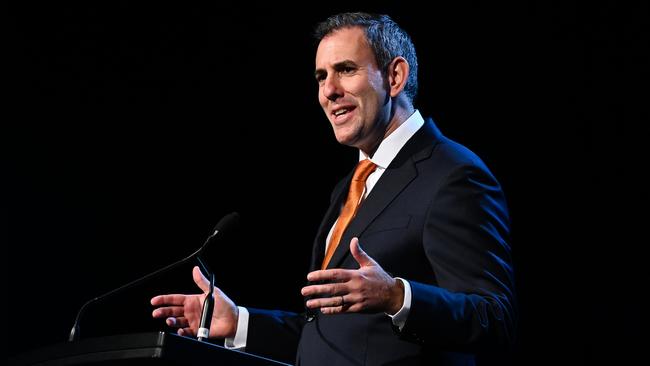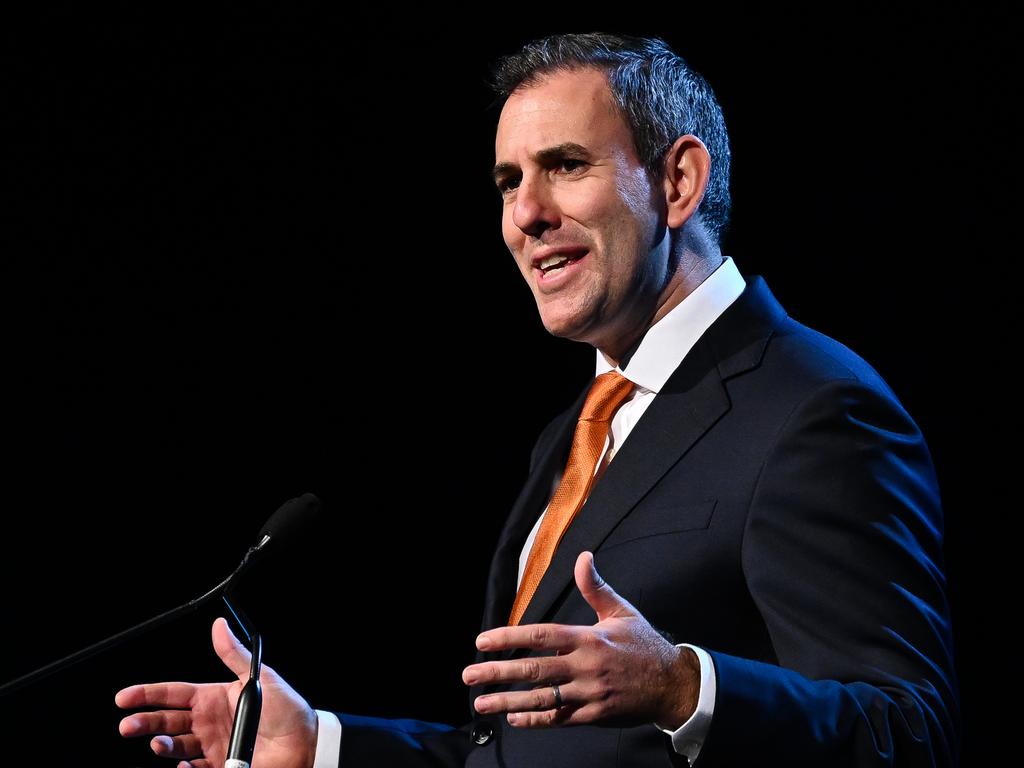Jim Chalmers protects the budget as calls for cost-of-living relief grow
The Treasurer has defended his ballooning budget surplus while rejecting calls to spend more on easing cost-of-living pressures.

Jim Chalmers has defended his ballooning budget surplus and rejected calls to spend more on cost-of-living relief, despite warning of “serious turbulence ahead” due to the Reserve Bank’s aggressive monetary tightening and global forces.
In a speech on Tuesday evening to welfare-sector leaders and progressive activists, the Treasurer revealed the Albanese government would soon track 50 indicators of community wellbeing to measure progress beyond gross domestic product, income and employment, “traditional economic metrics” the May budget had forecast would record only meagre growth in coming years.
Dr Chalmers also hit back at critics of his controversial summer political manifesto about reinventing capitalism, arguing the reaction to his essay “exposed the dispute at the heart of economic debate in Australia: between those who believe the fossilised fallacy that our economic and social objectives must be in conflict not concert – and those who reject it”.
“We have to show, as well as tell, that we don’t need to choose between acting responsibly with the budget and governing with compassion,” he told a Melbourne event hosted by the Brotherhood of St Laurence.
“In fact, one makes the other possible. Rejecting these dichotomies – wellbeing versus prosperity; society versus economy; compassion versus responsibility.”
New polling obtained by The Australian has found falling real wages and the big squeeze on family budgets have produced a sharp drop in the Albanese government’s standing with voters on economic issues, after 12 hikes in official interest rates since May last year and a sharp slowdown in consumer spending expected over the rest of this year.
Dr Chalmers defended an expected $20bn surplus for last financial year as fundamental to control inflation and said rebuilding fiscal buffers was at the heart of Labor’s purpose, which he characterised as having “hard heads and soft hearts”.
“Our efforts to strengthen the budget have not in any way come at the expense of helping people,” he said.
“The bigger surplus is in addition to, not instead of, cost of living relief.”
The speech comes as the OECD said temporary government support for households needed to zero-in on the most vulnerable, rather than be broadbased, which would risk building higher deficits and inflation.
“Through fiscal support, most OECD governments have helped cushion the immediate impact of the cost-of-living crisis on household finances, often at a sizable cost for public finances,” the Paris-based body said in its annual Employment Outlook published on Tuesday evening.
“This support should now become more targeted to vulnerable households to avoid turning into a permanent stimulus to demand and further fuelling price increases.”
The report said only a fraction of the relief measures adopted in the last two years “appears to be targeted to the most affected households and businesses”.
“Ensuring that support measures are targeted and temporary is important to concentrate the
support on those who need it most, preserve incentives for energy savings and avoid a persistent stimulus,” it said.
Dr Chalmers said inflation, which was 5.6 per cent in the year to May, is moderating.
“But it will be higher than we’d like, for longer than we’d like,” he said.
“And our economy is slowing because of interest rate rises, plus the impact of substantial global economic uncertainty.
“The impact of higher prices and a slowing economy is felt disproportionately by people already doing it toughest.
“In this complex environment, textbook fiscal policy requires us to take the pressure off inflation by rebuilding our buffers.
“To find ways of relieving cost of living pressures without adding to them. Meaningful tax reform to help fund our responsibilities.
“Returning most revenue upgrades to the bottom line. Keeping real spending growth down, focused on where we can make the most positive impact.
“Finding significant savings where there’s been waste or warped priorities. Prioritising the most vulnerable. And the most urgent areas like rent, electricity, out-of-pocket health costs, and wages.”
Brotherhood of St Laurence chief executive Travers McLeod welcomed introduction of wellbeing indicators, and called on the Albanese government to be bold in its policies as “the rest of this decade will make or break Australia”.
As well as measuring the health of the economy through employment, inflation and growth, Mr McLeod hoped the new focus would lead to a “fourth point on the compass that guides our conversations and decisions about the economy and our society – one which requires us to eliminate poverty”.
“Australia is the richest land on the planet,” he said. “We have the highest median wealth per person of any country.
“Yet one in eight Australians live in poverty. For Australia, it means 3 million of us face impossible choices every day, between food, medicine or heating a home.
“As a nation, we have a choice to make about the Australia we want for ourselves, our children and our grandchildren, in how ambitious we will be in preventing and eliminating poverty in this country.”
In an analysis of falling real incomes and higher profits, the OECD employment outlook found there was scope for Australian companies to reduce their margins and pay higher wages to restore worker purchasing power.
The report found that between late 2019 and the March quarter this year, Australia has experienced one of the largest increases in unit profits in the OECD between, with an increase of 26.1 per cent compared to the OECD average of 21 per cent.
Over the same period, the increase in unit labour cost remains lower, with an 13.9 per cent increase in Australia compared to 15.6 per cent in the OECD.
It said the greater increase in unit profits than unit labour cost was not isolated to any one sector but occurred in several sectors in Australia, including accommodation and food, manufacturing, trade, and transportation.
“Going forward, this evidence suggests some room for profits to absorb further partial adjustments in wages without generating significant price pressures or resulting in a fall in labour demand,” the report said.
Rather than the danger of a price-wage spiral, which it dismissed, the report said “on balance, the main problem going forward is a deepening of the cost-of-living crisis across the OECD”.
“A gradual recovery of at least some of the recent losses in purchasing power is essential to prevent widespread increases in economic hardship especially among workers with low earnings,” it said.
“A fair sharing of the cost of inflation can prevent further increases in inequality and support
effective monetary policy by averting feedback loops between profits, wages and prices.”
Both the RBA and Treasury have rejected arguments that excessive profits are behind the spike in local inflation, pointing to supply-side snarls due to the pandemic and Ukraine war as the main drivers of rising consumer prices.
Going forward, the OECD said “the focus should be on wages regaining some of the lost purchasing power gradually over an extended period of time, as quick and full recoveries of past inflation would most likely feed further inflation”.
“In the long run, sustained real wage gains can only be ensured through sustained productivity growth. It is therefore essential for OECD countries to deploy a wide range of labour market, skill, and competition policies to make the most of the opportunities afforded by new technological developments, such as Artificial Intelligence.”








To join the conversation, please log in. Don't have an account? Register
Join the conversation, you are commenting as Logout